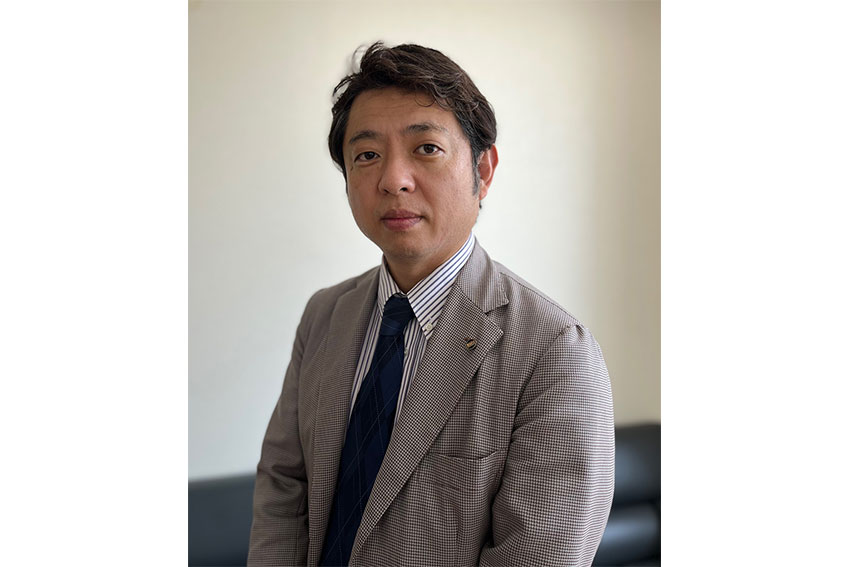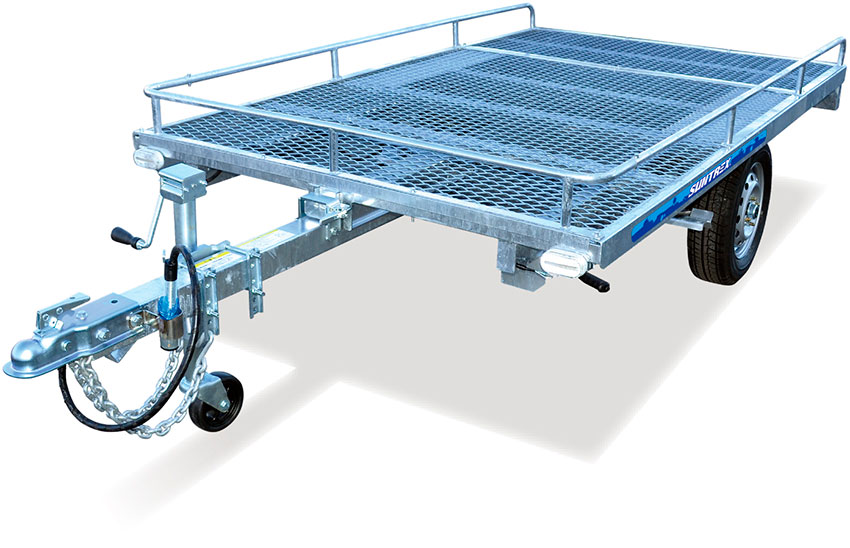As cars have grown to become an integral part of modern society, it is no surprise that peripherals and components for these automotives have increased in popularity. Sun Automobile meets this demand by providing products such as trailers and tow bars through their SUNTREX brand. In this interview, president Yohei Suzuki explains his company's unique philosophy that allow them to provide quality-products, as well as the plans he holds for the future of Sun Automobile.

Can you please share with us first what monozukuri means to you and your company, and what are some of the competitive advantages of Japanese manufacturers that allow them to be successful in very competitive markets?
The basis of monozukuri at Sun Automobile lies in stirring people’s emotions, meaning we provide automated parts that are used directly by our customers, and we want to make them happy when they're using our products. By making our products easy to use and of a high quality, we bring out people’s smiles and stir their emotions.
Our company’s catchphrase is ‘FOR YOUR SMILE’ and this consists of three different types of smiles. The first is the smile of our end users and the second is the smile of the distributors who sell our products to them. By making end users and distributors smile, that makes us smile too.
We truly believe in ‘magokoro’, which means ‘sincere heart’. By having a sincere heart and monozukuri-inspired manufacturing, and by having a positive attitude towards ourselves, we can produce quality products that are easy to use and bring a smile to customers.
It’s true that emerging countries like China, Taiwan and Korea have copied Japanese monozukuri, and now that the quality has gone up, it’s very hard to differentiate Japanese products from others made in those countries.
However, I feel that Japanese monozukuri still has a strong sense of heart in manufacturing. I'm not saying that other countries do not have that, but I feel that traditionally the Japanese people have kept this sincere heart in manufacturing. This means that you're placing the customer first so you can be attentive to quality and implement PDCA (Plan-Do-Check-Act), and if anything happens, you can respond right away to make customers happy. With all these efforts in responding to customers, Japanese companies are able to provide the quality and the performance that makes them competitive in difficult markets.
Among our current products that we are targeting for overseas markets are the SUNTREX series hitch members and trailers. In fact, we have the highest market share in Japan and we have a factory in Gunma prefecture and in Thailand, in Southeast Asia. Trailer hitch members - actually called ‘towing bars’ in globally - are widely used in the US, Europe and Australia, so these are the markets we are targeting.
Having only one factory in Japan had been a hindrance to our exports because of the extra shipping cost. By having a factory in Thailand, we are able to expand overseas whilst still being very particular about maintaining the ‘magokoro’ way of manufacturing. In fact, for the Australian market, we have already delivered over 1000 tow bar units.
With COVID we're stagnating, but once it's over, we would like to pursue international business further, firstly in Australia, then the US and then Europe. Tow bars are commonly used in these markets and since strategically, as well as geographically, Australia is closest to us, we'll start with the closest market.

The Japanese population has the oldest average life expectancy in the world of 85 years. More than one third of the population is over 65, which means a reduced labor force and less demand for products in general. How has this declining demographic affected your company and how are you reacting to this particular challenge?
It’s true that the demographic decline has caused a great threat to our company. We cannot automate. We have more than 500 items in our tow bar line up and all of them have defferent shapes require manual crafting to a certain extent, like with the welding, so we’ve had to secure more and better engineers to pass down the knowledge on how to do that.
What we are now doing is collaborating with university’s students who are studying for industrial degrees, and we’re providing them with internships and opportunities to work from an early age in our factory in order to learn about the required skills.
We are also actively hiring older workers aged over 70 so that they can pass on their knowledge to the next generation. We are trying to create this system in Gunma prefecture so we can make sure that this technological know-how is being passed down.
In terms of providing for the global market, we have our factory in Thailand and once a year, we have our personnel come over to Japan to perform training and learn about the quality and skills required. They also learn about the mindset of ‘monozukuri’ and attain the same level of understanding and competence as our team in Japan.
The automotive sector is undergoing a time of great change in two main respects – the shift to EV’s and the increasing use of lighter materials, such as aluminum and CFRPs (carbon fiber-reinforced polymer). Can you please tell us what the impact of these changes in the automotive industry are having for your business?
There may not be an immediate impact on us, but in the near future, there will certainly have to be changes made to our tow bar. Currently, we use stainless steel to manufacture our tow bars, but with the changes in the automobile industry that you mentioned, CASE ("Connected", "Autonomous", "Shared", "Electric") cars will have different accessories and we are working towards making our products lighter by using aluminum and CFRP. In fact, we already have a prototype CFRP tow bar.
What role does collaboration or co-creation play in your business model and are you currently looking for partners either in Japan or overseas?
Currently we're collaborating with a tent manufacturer to combine a tent with our trailer as outdoor pursuits and camping are becoming popular in Japan. We'll be releasing a new model this year.
Of course, collaboration is the key to unlocking the global market. In fact, in Australia, we have collaborated with a distributor as well as a parts manufacturer. In order to achieve the desired outcome, it's important to collaborate with specialists in each field and combine them as a team and be flexible in dealing with situations as they arise.
What is the current focus of your product development strategy, and are there any new or up-and-coming products that you'd like to share with our multitude of international readers?
Currently, trailers are a hot topic in society and there are so many possibilities trailers can provide. For example, camping is one of the things I mentioned, and adding an accessible toilet to the trailer makes it more mobile, meaning that it can be used at outdoor events and also can cater to people in wheelchairs. We're collaborating with an automobile company on this.
You can also create things like a mobile PCR testing site on a trailer, so there are many options for collaborating with specialized companies whose products can be made more mobile and accessible by using a trailer as a platform.
We have 56 years of experience and know-how, and by combining our knowledge with partnering companies, we can cater to the ever-changing needs of society. We had an offer from a house-building company to build dwellings on top of the trailers so they become mobile homes.
Conventionally, trailers were used to carry jet skis and boats, but now people have realized there are many other things that trailers can do, so we're now communicating with many partnering companies about – for example - having a house on the platform, using it to carry motorcycles or using it for farming.
Your ‘S Drive’ improper start suppression system is designed to prevent accidents. Can you please explain to us some of the distinguishing features of this product and what role it plays within your product lineup?
In our product philosophy, it is crucial that we have high quality, which means safety and reliability. We always see what is required by our customers first. In fact, our ‘S Drive’ system, which we have patented, started off in development in 2009, 13 years ago.
The use of faulty brakes and accelerators has recently become a big issue in Japan. However, we’ve been applying our philosophy of safety and reliability to products since before these factors became an issue, and safer driving has been a central part of our R&D efforts. Providing assurance to our customers through our products has always been important to us.
Can you please elaborate for us a little bit about how you plan to expand your business overseas and which particular regions or markets are most key to that process?
Our international strategy differs depending on the country. For Australia, there's a free trade agreement with Thailand, so we can export directly to Australia. We have a distributor there and also a stockyard with another partnering company. Eventually we'll be establishing a joint venture company together there.
As for the US, it's quite far to send our products there from Thailand, but in the long run, we would like to have a local factory there. Currently we have a subsidiary on the US West Coast, as well as the stockyard. We would like to continue pursuing the American market and in due course, we will eventually have a clear vision on how to tackle the European market.
Let's say we come back to interview you again for your company’s 60th anniversary. What would you like to tell us about your goals and dreams for the company in that timeframe? What message would you like to send to your employees and overseas markets?
I succeeded my father last year, although the founder of the company is not in our family. This year, I created the company’s philosophy, as well as management plan. We now have a definite numerical figure on how much improvement the company is targeting. In terms of global expansion, we would like to realize it within three years and make our company global, starting with Australia.
In the near future, maybe our headquarters may relocate to somewhere else. In order to do that, we want to at least double the number of employees. We have a target to double or triple sales turnover in a few years’ time.
Also, it's important that each member of our staff plays their part on a daily basis, making small efforts day by day in order to achieve a bigger dream or goal. Instilling these principles is what I would like to achieve by the time you come back.
0 COMMENTS